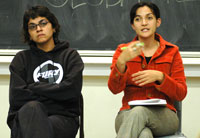Women and a rebellion
Rising up to a nation, Zapatista women also reshape their homes

Ryan Tubongbanua / The Collegian
Translating for Mexican sociologist Gabriela Martinez Lopez (left), alternative economics director Jennifer Miller explained the history of the Zapatista struggle against the Mexican government. |
By Laban Pelz
The Collegian
Little by little, women living in the Chiapas region of Mexico have constructed a democracy, Mexican sociologist Gabriela Martinez Lopez said Tuesday night in McLane Hall.
Speaking through an interpreter, Lopez highlighted the involvement of women in the Zapatista rebellion against the Mexican government’s exploitation of Chiapas’ people and natural resources.
“Women Confronting Globalization” was organized by Fresno State’s M.E.Ch.A. and by the Mexico Solidarity Network.
Before Lopez spoke, her interpreter, Jennifer Miller, touched on the history of the Zapatista struggle against the central government.
She said the current economic and political philosophy driving relations between Mexico and other nations and within itself is neo-liberalism, where the state plays a diminished role and private corporations take over such tasks as social services and even military functions.
“There’s an easy movement of money and goods, but not of people,” said Miller, an alternative economics director with the MSN. “People are not as valued as resources.”
She said the resources found in Chiapas have led to years of exploitation of the region’s people. Sixty percent of Mexico’s hydroelectric energy comes from Chiapas, she said, and many natural medicines are found there.
“Companies want to patent it, and they’ve made it illegal for indigenous people to cultivate,” Miller said.
Because of the resources in Chiapas, Mexico has stationed 80,000 troops, some government and some paramilitary, in the region, with many of the barracks next to villages. Miller said one paramilitary group in particular has been responsible for much destruction as well as assassinations in Chiapas.
“This is one way for the government to clean its hands of it,” she said.
“And there’s the heavy hand of the U.S.,” Miller said. “In 1995, when the U.S. loaned Mexico $50 billion, the deal was for the U.S. Treasury to have veto power over Mexico.”
She also said the North American Free Trade Agreement protects only corporate interests, and U.S. subsidies haven’t helped.
“We haven’t seen very many sustainable jobs created through NAFTA,” she said.
Miller said the Mexican government had to make 300 changes to its constitution to be a part of NAFTA, and one change in particular took land set aside for communities and privatized it.
She said those living in Chiapas have been caught in a cycle of poverty similar to the plight of share-croppers in the post-Civil War United States, often paying more to farm the land than what they make off their labor.
Work was often paid for in alcohol, she said.
Miller said because Chiapas was and is the richest region in Mexico in natural resources, but also the most exploited, the Zapatistas rose up against the government in 1994 in armed rebellion.
“They had long sticks and machetes, and Mexico was backed up by the U.S.,” she said. “So you can imagine the discrepancy.”
Miller said violent resistance has since ended, but the Zapatistas are still armed, and will remain so until Mexico agrees to demilitarize the region, liberate political prisoners and comply with its original laws.
People in the Chiapas have since created an autonomous education system and also health clinics using both traditional and Western medicine, she said.
Lopez has been working in Chiapas since 1997, and said women involved in the Zapatista movement have bettered not only their people’s standing in Mexico, but also their own place at home.
She said before the uprising the women introduced to the Zapatista council the Women’s Revolutionary Law, which demanded democratic rights for women, and specifically the right to inheritance, property ownership, to choose whom to marry and to be respected when in roles of power.
Lopez said in Chiapas the word “custom” is traditionally synonymous with the word “right,” and this had to be broken down in order to progress.
She said one of the biggest accomplishments of these women has been the creation of artisan cooperatives, where women make clothing and other wares to sell outside the region.
The money is then split evenly among the women, and has been used to construct autonomous health clinics.
Lopez also questioned whether Western feminist discourse sufficiently covers the experiences of all women.
Comment on this story in the News forum >>
|
